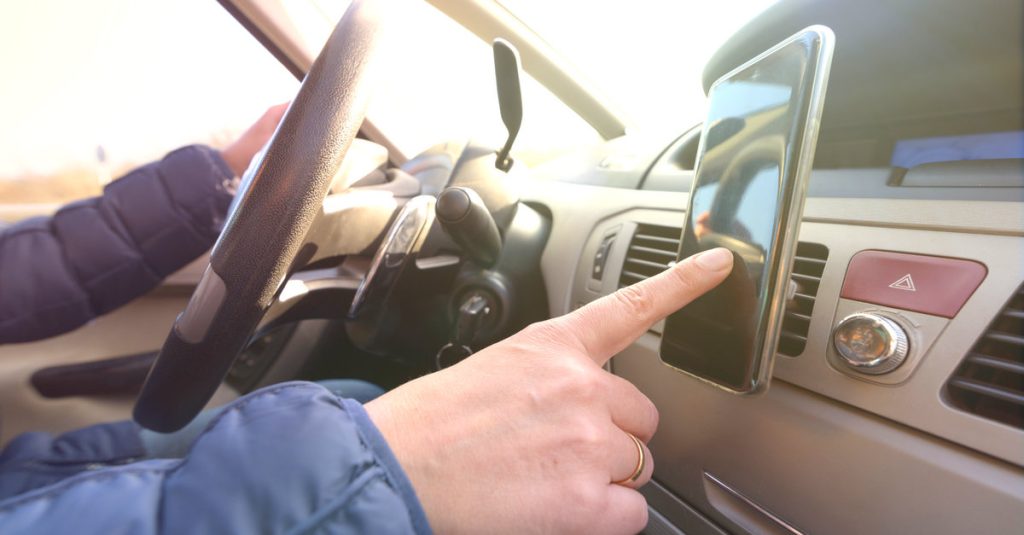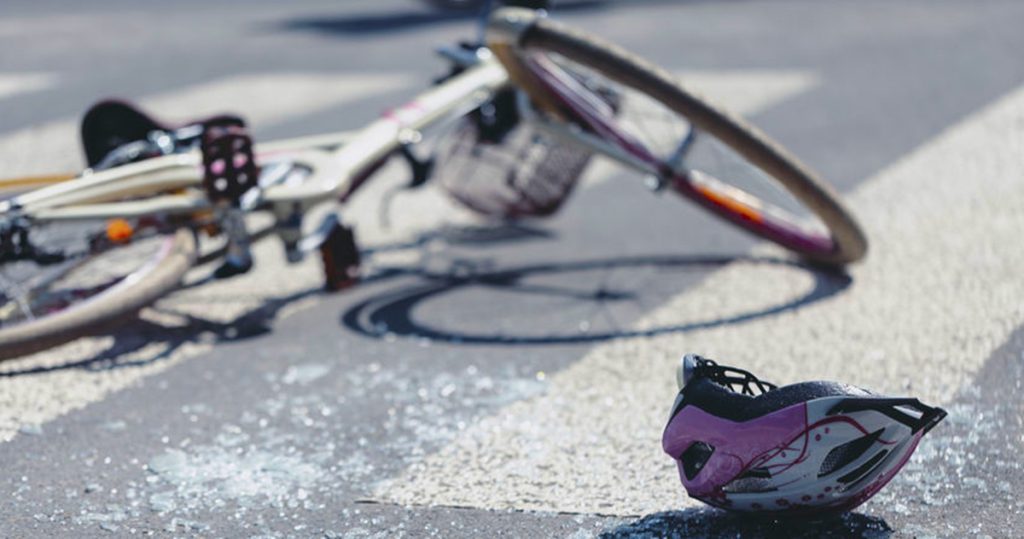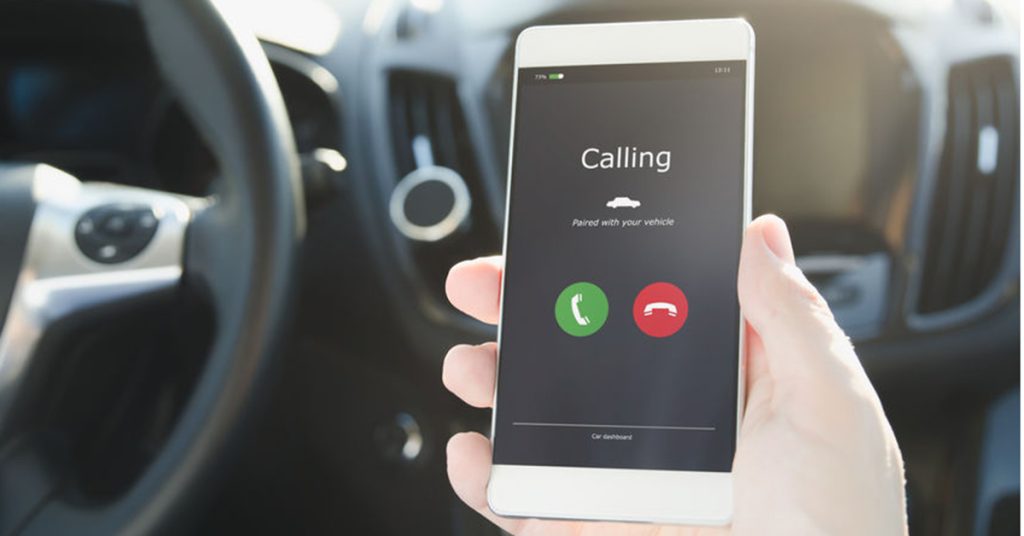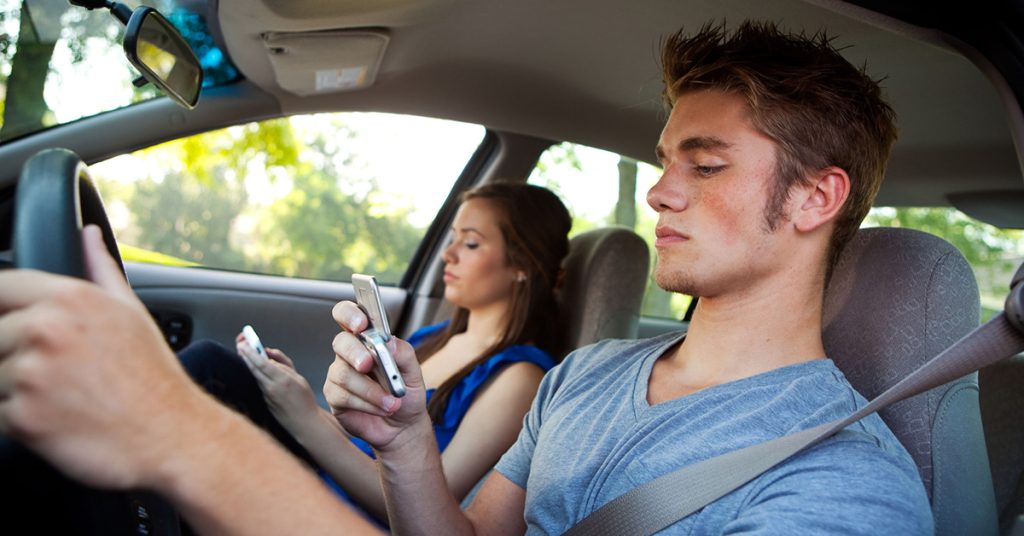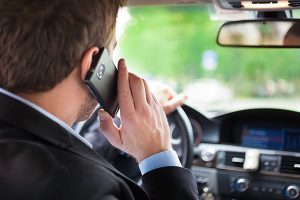Texting While Driving
Proposal to Strengthen Massachusetts Hands-Free Driving Law By Adding Ban on Recording and Broadcasting While Driving
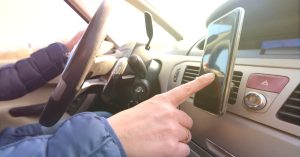
Drivers are not allowed to pick up cell phones under the Massachusetts hands-free driving law, but can quickly tap the device for activation of hands-free mode or GPS.
A dangerous trend has emerged on our roads, cell phones and social media accounts, with the rise of drivers “vlogging,” live-streaming and making video phone calls. In a 2020 survey, more than 20 percent of drivers admitted to recording video on cell phones. This is more than double the response from 2015.
Now, after a cyclist’s tragic death, a local lawmaker is proposing Massachusetts update its hands-free driving law to ban both recording and broadcasting video while driving.
Nationwide, 48 states have banned texting while driving and 24 states have passed hands-free driving laws, according to the Governors Highway Safety Association.
Massachusetts would join four other states which have banned recording and broadcasting as part of their hands-free laws, according to state Sen. Jo Comerford, D-Northampton, who has proposed the legislation.
Sen. Comerford proposed “Charlie’s Law” in the wake of a cyclist’s death near Northampton High School in October 2021. A 23-year-old driver is accused of video chatting on the FaceTime app, then running past a stop sign and striking the cyclist in a fatal bike crash, according to local news reports. The driver now faces criminal charges, including negligent motor vehicle homicide. Meanwhile, state lawmakers held the first hearing on Charlie’s Law earlier this month.
Background on Massachusetts Distracted Driving Laws
Looking to prevent injuries and deaths in car accidents, Massachusetts passed a ban on texting while driving in 2010. After many years of debate, lawmakers reached agreement on a more comprehensive hands-free driving law in 2019.
The Massachusetts hands-free driving law took effect in early 2020 and drivers now face fines for violations, starting with $100 for the first offense.
For third and subsequent offenses, drivers face up to $500 in fines and an insurance surcharge. They must also attend a distracted driving education program.
Under the hands-free law, drivers are only allowed to touch mobile phones and electronic devices to quickly activate hands-free mode, when devices are mounted to a windshield, dashboard or center console. Drivers are still allowed to use voice-to-text commands and make phone calls so long as cell phones are properly mounted.
As it stands, the Massachusetts hands-free driving law does not specifically ban drivers from making video conference calls or vlogging activities, such as recording or live broadcasting video of one’s self while driving to post on social media sites. As long as cell phones are mounted, drivers are not violating the law.
Drivers may be cited or charged if police investigate a car crash and find they violated another traffic law, such as a marked lanes violation. But updating the hands-free law – which is a primary enforcement law – may allow police to stop and cite drivers they see using cell phone video features before a crash happens.
Sen. Comerford has proposed S. 2733, “An Act Prohibiting Video Recording or Broadcasting While Driving.” The bill proposes adding language to the existing law stating no operator shall record or broadcast video of themselves on a mobile device, with a few exceptions.
- Drivers would still be allowed to record or broadcast video in an “emergency or exigent circumstance” or “when it is so clearly in the public interest as to override the public safety purpose of this sentence.”
- Dash cams can still be used to record traffic conditions or passengers in a vehicle, but they must be mounted. This allows commercial drivers, Uber and Lyft drivers to continue recording passenger behavior.
More Than Twice As Many Drivers Admitted to Recording While Driving in 2020
In its 2021 Driving While Distracted study, State Farm Auto Insurance reported 22 percent of drivers admitted to recording behind the wheel in 2020, compared to 10 percent in 2015.
Younger drivers were more likely to engage in this behavior:
- Nearly half – 44 percent – of drivers in the 18 to 29-year-old demographic admitted to recording video while driving.
- More than a third of drivers age 30 to 39 admitted the same.
This was not the only increase. State Farm reported 89 percent of drivers – or nearly 9 out of 10 – admitted to engaging in one of the 14 distracted driving behaviors covered in its online survey.
One troubling note was most drivers in states which had passed hands-free driving said they were aware of laws, but one in five were not informed. Six percent of the drivers even said their state did not ban handheld cell phone use.
Contact Breakstone, White & Gluck For a Free Legal Consultation – Boston Personal Injury and Car Accident Attorneys
At Breakstone, White & Gluck, our Boston personal injury lawyers offer more than 100 years combined experience representing those injured by negligent and reckless driving. Our attorneys work with clients throughout the Boston area, including those who live and work in Boston, Cambridge, Somerville, Everett, Brookline, Arlington and Quincy.
If you have been injured in a car accident caused by another driver’s negligence, you may require medical care and have to miss time at work. You may have many questions. For a free legal consultation, contact Breakstone, White & Gluck at 800-379-1244 or use our contact form. Our attorneys will review the facts of your case with you and help you determine whether you have a potential claim.
Distracted Driving Accidents Have Seriously Injured Cyclists in Massachusetts, Pennsylvania and Florida

Over the past year, distracted driving accidents have seriously injured cyclists in Massachusetts and other states.
During the past few months, you may have noticed more bicyclists and fewer cars out. Massachusetts bike shops have confirmed that sales are way up since the COVID-19 emergency began. And during an uncertain time, it has been nice to see people enjoy bikes.
But now, as Massachusetts slowly re-opens the economy, driving patterns are changing again. More cyclists are out, but increasingly, so are cars. Coincidentally, traffic laws have also changed. As of April 1st, the Massachusetts hands-free driving law took effect, banning all hand-held cell phone use. Going forward, drivers must connect to voice-activated technology.
This is an important new law for cyclists, who often travel to the immediate right of a vehicle in the bike lane or roadside. When a driver doesn’t pick up a phone, this takes away an unexpected movement, a layer of danger to cyclists.
But several other layers remain. The reality is many drivers do not even realize cyclists are nearby. But cyclists are close and are vulnerable to your quick, unpredictable movements, such as when you pick up a cell phone, reach into your glove compartment or open a fast-food bag as you drive. Or when you tend to your children or other passengers.
If you are a Massachusetts driver, now is the time to set up your vehicle for hands-free cell phone use. Commit to follow the new law and drive safely.
Also commit to check for cyclists. When you stop at a traffic light or stop sign, check in front of you, to each side and behind you. Bicycle accidents often happen because cyclists are approaching from behind cars. Many drivers neglect to look there. Drivers are less likely to look if they are focused on their cell phone or texting while driving.
Many communities are expanding sidewalks or changing traffic patterns to make room for social distance. This means you may encounter cyclists in new areas. Approach slowly, with caution and patience.
Recent Cases: Distracted Driving Accidents and Injuries to Cyclists
Over the past year, there have been several news stories about distracted driving, leading to cyclist injuries and deaths. Even as states such as Massachusetts and Maine have strengthened laws, the number of distracted accidents continues to rise.
Ipswich Texting While Driving Crash Kills Cyclist
On March 26th, just days after the Massachusetts stay at home advisory took effect, there was a tragic crash on an Ipswich Road. According to the The Boston Globe, a 43-year-old driver fatally struck a cyclist in the North Shore community, also injuring two other family members on bikes. Ipswich Police and the Essex County District Attorney’s office announced the driver has been cited for motor vehicle homicide by negligent operation, marked lanes violation and composing, sending and reading an electronic message. A clerk magistrate will decide whether a criminal complaint will be issued.
Pennsylvania Driver Accused of Texting in Cyclist’s Death
In April 2019, a Pennsylvania woman was accused of texting while driving. Penn Live, a local news website, reported she struck a male cyclist in Mount Joy Township. Forensic analysis determined she had sent a text message a minute before the crash. She received a message, then tried to call 911, as a neighbor also called in.
The cyclist died from multiple traumas nine days later. In this case, the driver was charged with felony homicide by vehicle, misdemeanor involuntary manslaughter, and cited with traffic citations in the crash, according to Penn Live.
Florida Distracted Driving Case Ends in Fine, Community Service
In January 2020, a Florida woman pleaded no contest in a fatal crash which killed two cyclists and seriously injured several others. In November 2018, the woman had struck the group of 14 cyclists with her vehicle. They were members of a local bicycle club riding in Davie, a community in Broward County.
According to the Sun Sentinel newspaper, the woman admitted to reaching into her glove compartment for her cigarettes. She also said she was temporarily blinded by sun glare. Police allege the woman was also traveling 70 mph on a 55 mph road when she struck the cyclists. This was a horrific crash and many involved were deeply upset with the outcome. In this case, local prosecutors maintained the woman’s actions did not warrant a criminal charge of motor vehicle homicide, according to the Sun Sentinel. So the driver pleaded no contest to careless driving, leaving court with orders to pay a $1,000 fine and complete 120 days of community service. She also lost her driver’s license for six months.
Free Legal Consultation
Boston Bicycle Accident Lawyers – Distracted Driving Injuries to Cyclists
At Breakstone, White & Gluck, our Boston bicycle accident attorneys have more than 100 years combined experience. We represent cyclists and others who have been injured by distracted driving, including a driver’s negligent use of a cell phone.
Distracted driving accidents can seriously injure cyclists. We urge you to act right away if you suspect a driver’s cell phone use may have caused your injuries. If you or a loved one was injured, it is important to consult an experienced lawyer to learn your rights. You may be entitled to pursue financial compensation for your medical bills, lost wages, pain and suffering and other financial losses.
For a free legal consultation, contact Breakstone, White & Gluck at 800-379-1244 or 617-723-7676. You can also use our contact form.
Massachusetts Hands-Free Law Update: Fines Can Begin April 1, 2020
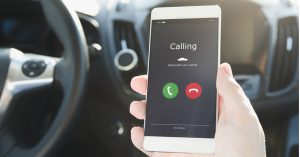
The Massachusetts hands-free driving law bans this action. Fines start today, April 1, 2020.
As of today April 1, Massachusetts police departments can start to issue citations and fines to drivers who violate the Massachusetts hands-free driving law. We encourage you to follow the Massachusetts COVID-19 “Stay at Home” advisory. But if you have to go out, you can help yourself drive more safely and avoid a fine by checking that your car is set up for hands-free mode. Even better? Read this update, but turn off your cell phone while driving. Many of us are exhausted and out-of-routine. Focus on the roads and what you need to get done, so you can get back home.
So far, many drivers are still picking up phones, despite the new law. During the initial grace period from Feb. 23-Mar. 31, police issued 4,500 written warnings across Massachusetts, according to a state official interviewed by WGBH. The official said drivers must become aware of both the law and that police are watching.
“…the police officers I’ve talked to seem to say that everyone who is pulled over says, “Yes, I’ve heard about it. Sorry. My mistake,” said Jeff Larason, director of highway safety at the Massachusetts Executive Office of Public Safety. (Listen to the WGBH segment in full).
Massachusetts passed a texting while driving law in 2010 but lawmakers spent nearly 10 years debating the handheld cell phone ban.
The Massachusetts hands-free driving law was passed by the Massachusetts Legislature in November 2019 and quickly signed by Gov. Charlie Baker on Nov. 29. To help drivers get ready, the state granted an initial grace period. Larason told WGBH 4,500 drivers had received written warnings (broadcast date: March 13). The Boston Globe reported State Police had issued 578 warnings to drivers, in just the first week. On Cape Cod, local police reported 150 verbal or written warnings in the first week (Source: South Coast Today via Cape Cod Times).
What the law allows and bans:
- The law states drivers cannot use any electronic device, including mobile telephones, unless the device is being operated in hands-free mode.
- Drivers can only touch cell phones and mobile phones once to activate hands-free mode.
- Cell phones must be properly mounted to the windshield, dashboard or center console and not impede with operation. This is the only way drivers are allowed to use GPS or voice to text technology such as Bluetooth.
- Drivers are specifically not allowed to touch phones for texting and emailing. Use of apps, video or Internet is also prohibited.
- Drivers who are 18 and younger are not allowed to use cell phones behind the wheel. Hands-free is illegal and can result in violation of their Massachusetts Junior Operator’s License.
- You may be stopped. But you are not allowed to pick up your phone at red lights or stop lights.
- You can pick up your cell phone and make a call if you are in a stationary position, outside a travel lane or bicycle lane.
- There is also an exemption for emergency professionals who need to pick up the phone for calls and those calling 911. 911 calls must be taken seriously. The state advises drivers to make every attempt to pull over before calling 911 – even if you are in hands-free mode.
Violations of the Massachusetts Hands-Free Driving Law
Police in Massachusetts can now start issuing tickets. Here are the penalties:First offense: $100 fine.
Second offense: $250 fine and distracted driving education.
Third offense: $500 fine and distracted driving education.
With a third offense, you may face an insurance surcharge.
Related:
Massachusetts hands-free driving law, Mass.gov
Breakstone, White & Gluck – Boston Personal Injury Lawyers: 800-379-1244
With more than 100 years combined experience, Breakstone, White & Gluck specializes in representing plaintiffs in personal injury cases involving car accidents, truck accidents, pedestrian accidents and bicycle accidents. Our attorneys have extensive experience handling cases for clients injured by negligent use of cell phones and texting while driving. We represent clients across the state of Massachusetts in car accident cases, including in Boston, the North Shore, the South Shore and Cape Cod.
We are open and working remotely for our clients during the state’s COVID-19 advisories. If you have been injured, we are providing free legal consultations at 800-379-1244 or 617-723-7676. You can also use our contact form.
State of Massachusetts Releases Education Materials on New Hands-Free Driving Law

Hand-held cell phone use becomes illegal in Massachusetts on Feb. 23, 2020, when the new hands-free law takes effect.
The state of Massachusetts has published a new web page and pamphlet on the new hands-free driving law, which takes effect on Feb. 23rd.
While Massachusetts passed a texting while driving ban in 2010, it was the final New England state to enact hands-free legislation in November. When the new law at last takes effect, drivers will be prohibited from using cell phones and electronic devices, unless they are in hands-free mode or they have to call 911 for an emergency.
Distracting driving is a serious safety threat on the roads, causing 9 deaths and more than 1,000 injuries each day in U.S. traffic crashes, according to the CDC. This goes beyond just cell phone use. Think of it as any activity which takes your eyes off the road, your mind off the road or your hands off the wheel.
Texting while driving and cell phone use cause many injuries each year. If the news stories have not deterred you, the new Massachusetts hands-free law should; it is about to become much easier for police to identify drivers who are using cell phones illegally.
Penalties for violating the Massachusetts hands-free law:
For a driver’s first offense, there is a $100 fine. The second offense carries a $250 fine and drivers must complete a distracted driving education program. Third and subsequent offenses can lead to a $500 fine and drivers will have to attend the education program. At this point, drivers can also face an insurance surcharge.
What becomes illegal under the Massachusetts hands-free law:
No Holding Your Cell Phone. Cell phones must be mounted or installed in your vehicle before you use hands-free technology or voice-to-text communication. Drivers can only touch their cell phones to make an initial swipe to activate hands-free mode.
No Touching Your Cell Phone Screen. Drivers cannot touch cell phones to email, check social media or watch video. All other Internet use and app use is also banned.
Get Your GPS Ready. GPS is a critical tool for many drivers. Going forward, be aware that you can only activate your GPS from an electronic device which is installed in your vehicle or properly mounted on the dashboard.
No Cell Phone Use at Red Lights. You can only pick up your cell phone if your car is stationary and safely outside the travel lane. Hand-held cell phone use at stop signs and red lights is a violation. Along with drivers, cyclists are also banned from using hand-held electronic devices.
Visit the state of Massachusetts web page to learn more.
Our Final Note
Massachusetts drivers must continue to use caution under the new hands-free law. Even if you follow the law, hands-free doesn’t mean distraction- or accident-free.
Free Legal Consultation – Boston Personal Injury Lawyers
Breakstone, White & Gluck is a Boston personal injury law firm with extensive experience handling Massachusetts car accident claims for those injured by negligent driving. If you have been injured, our attorneys are here to advise you of your rights to file a claim against the driver or another party who may be at fault. For a free legal consultation, call Breakstone, White & Gluck at 800-379-1244 or 617-723-7676. You can also use our contact form.
Massachusetts Passes Hands-Free Driving Law
 Massachusetts has finally approved distracted driving legislation. Gov. Charlie Baker signed on Monday, establishing New England as a hands-free driving zone.
Massachusetts has finally approved distracted driving legislation. Gov. Charlie Baker signed on Monday, establishing New England as a hands-free driving zone.
According to The Boston Globe, the new distracted driving law will take effect on Feb. 23, 2020. Massachusetts police officers will issue warnings until the end of March, then citations will begin. This transition period is meant to help drivers get used to the new law. Become familiar with Bluetooth and other “hands-free” technologies now, and if you plan to use an electronic device for navigation, purchase a mount for your windshield or dashboard.
Until now, most drivers have been able to pick up cell phones to talk in Boston and across Massachusetts. However, under the 2010 texting while driving ban, drivers cannot text, read emails or use social media. This has helped deter some drivers, but overall, not enough without a handheld cell phone ban.
Come next year, Massachusetts drivers can only use cell phones under limited circumstances. Drivers can use electronic devices on “hands-free” mode (though they do get a single-swipe to activate or de-activate the “hands-free” mode). As we mentioned, they must use Bluetooth or a similar “hands-free” technology and mount navigation devices.
Police officers can stop drivers as a primary offense, which is more leeway than they have in enforcing seat belt use. Officers will be required to collect data – including age, race and gender – when they issue a warning or citation. The state will use this data to monitor potential racial profiling by police departments.
The new Massachusetts distracted driving law brings notable consequences. These alone are good financial motivators for putting down your cell phone.
Under the new law, drivers will be fined $100 for the first offense, $250 for the second offense and $500 for the third offense (and any subsequent offense). Second-offenders have to participate in a driver safety course. Drivers can also face an insurance surcharge.
Safety is the most important point. Cell phone use is responsible for more than 1 of 4 car crashes, according to the National Safety Council. Distracted drivers killed 3,166 people across the U.S. in 2017, according to the National Highway Traffic Safety Administration. These are hard numbers to hear.
Massachusetts now joins every other New England state in improving hands-free cell phone legislation. Maine was the last state to approve legislation this past summer. According to the National Conference of State Legislature, 20 states already have laws which ban handheld cell phone use, so Massachusetts could be the 21st.
Read the law: AN ACT REQUIRING THE HANDS-FREE USE OF MOBILE TELEPHONES WHILE DRIVING, 2019 Mass. Acts 122
Boston Car Accident Lawyers – About Breakstone, White & Gluck
At Breakstone, White & Gluck, our Boston car accident lawyers have over 100 years combined experience and provide expert investigation into car crashes involving negligent cell phone use. We represent clients who have been injured by negligent driving across Massachusetts, including in Boston, Cambridge, Somerville, Quincy and Braintree. South of Boston, our attorneys have represented numerous clients, including those injured in Brockton, Plymouth and Cape Cod, as well as in Framingham, Worcester and north of Boston, Salem, Peabody, Newburyport and Saugus.
If you have been injured, learn your legal rights. Call 800-379-1244 or 617-723-7676 or use our contact form.
National Teen Driver Safety Week is October 20-26, 2019
 National Teen Driver Safety Week will begin Sunday. While your teen may learn about this topic at school, parents can also become involved and learn alongside teens. Parents influence their children in many ways. If you can influence the discussion on safe driving, you could save a life.
National Teen Driver Safety Week will begin Sunday. While your teen may learn about this topic at school, parents can also become involved and learn alongside teens. Parents influence their children in many ways. If you can influence the discussion on safe driving, you could save a life.
It’s a well-known and tragic fact: motor vehicle crashes are the leading cause of death for teens. In 2017 alone, 2,526 teens were killed in crashes, according to the to the National Highway Traffic Safety Administration (NHTSA).
This is the 12th year that National Teen Driver Safety Week has been observed. Two Pennsylvania lawmakers, Congressman Charlie Dent (R-PA) and Senator Bob Casey (D-PA), introduced the legislation establishing the annual event in October 2007.
National Teen Driver Safety Week highlights many topics, including graduated licensing laws, distracted driving, speeding and obeying fundamental traffic laws. It also provides resources on helping teens through their first few weeks as a licensed driver, along with handling stressful and emotional driving situations, including car accidents. Visit teendriversource.org to learn more.
State Graduated Driver Licensing (GDL) Laws
We are going to write about graduating licensing laws because these are the foundation for teaching teens to drive safely. All 50 states have a law in place, but these vary in restrictions, according to the Insurance Institute for Highway Safety (IIHS). Florida was the first state to adopt a graduated licensing law for teens in 1996. Massachusetts lawmakers approved a Junior Operator Law in 2007, which increased driving training requirements and penalties.
The law places restrictions on teens with licenses between the ages of 16 ½ and 18. First, as you may know if you are a parent, teens have to obtain a learner’s permit. Next comes 30 hours of classroom training on Massachusetts motor vehicle laws and safe driving techniques. Beyond the classroom, there is another 18 hours of instruction, including 12 hours behind-the-wheel and 6 hours of observation.
Here are some of the restrictions under the Massachusetts Junior Operator Law:
Passenger Restriction. Teens are not allowed to drive with other passengers under age 18 until they have been licensed for 6 months. There is an exception for siblings.
Night Driving Restriction. Another restriction is teens cannot drive between the hours of 12:30 a.m. and 5 a.m.
Cell Phone Use Restriction. Teen drivers cannot use cell phones or mobile electronic devices. Texting while driving is also prohibited, for all other drivers in Massachusetts.
Teens can expect to receive a significant license suspension if they violate these restrictions. For instance, there is a 60-day license suspension if your teen is caught driving between 12:30 and 5 a.m. There is a 90-day suspension for a first offense of speeding. For the second offense, there is a full-year suspension.
Massachusetts’ Junior Operator Law violations
Visit teendriversource.org for more on National Teen Driver Safety Week.
Fewer Teen Drivers
In recent years, Massachusetts has actually reported a reduction in teen deaths and non-fatal injuries in drivers age 16 and 17. This is a positive development, except when you look closer. There has actually been an increase in hospital rates for crash injuries in drivers between 18 and 20 years old. The state and a Boston Globe analysis attribute this to the fact that many teens are now waiting to get their license until age 18. By doing so, teens can skip driver’s education, which became more expensive and time-consuming when the Junior Operator Law took effect.
If your teen delayed getting their license, make sure they take time to learn the fundamentals and get the practice they need. Driver’s education is a critical component to developing a safe driver.
About Breakstone, White & Gluck – Experienced Boston Car Accident Lawyers
The Boston personal injury lawyers at Breakstone, White & Gluck specialize in representing those injured in motor vehicle crashes in Massachusetts. With over 100 years combined experience, our car accident lawyers have the expertise to guide our clients to the best financial results in case involving motor vehicle accidents and truck crashes.
For a free legal consultation, contact us at 800-379-1244 or 617-723-7676. You can also use our contact form.
Study: Teen Crashes Cause Nearly 20 Percent More Deaths On Summer Days
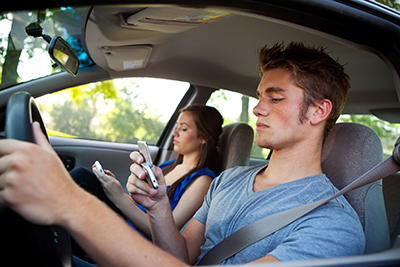
A recent study shows teen drivers are more likely to cause crashes resulting in injury or death during the summer months.
When your teen driver picks up the keys, you may casually say, “Have fun and be safe.” But this is when your worry sets in.
In this blog, Breakstone, White & Gluck reports on the latest research on teen drivers along with essential safety fundamentals to share with your family. Our partners each have more than 35 years of experience representing those who have been injured by negligent drivers in Boston, Cambridge and across Massachusetts. To avoid these tragedies, we encourage parents to play an even more proactive role to encourage safety during the summer months.
AAA Foundation for Traffic Safety “100 Deadliest Days” Study
A new study reports two-thirds of people injured or killed in car crashes involve a teen driver. The AAA Foundation for Traffic Safety released this figure as part of its “100 Deadliest Days” report on the period from Memorial Day to Labor Day. During the past five years, nearly 3,500 people have been killed in crashes caused by teens during the summer months, according to AAA.
More than a quarter of the teen driving crashes were caused by speeding. Teens who were drinking and driving caused 17 percent of the deadly collisions while distracted driving behaviors caused 9 percent of the deaths.
Other findings:
- Teen drivers, age 15-18, are 17 percent more likely to cause a fatal car crash in the summer than other times of the year.
- The legal age for consuming alcohol is 21 years old in every state. Yet 1 in 6 teens involved in fatal summer crashes tested positive for alcohol.
- More than 52 percent of teens participating in AAA’s research reported they had read a text message or email while driving in the past 30 days. Another 40 percent admitted to sending one.
- As part of its research, AAA used in-vehicle dash cameras and found 58 percent of teens who caused a crash were engaged in distracted behaviors. This was four times as high as federal estimates.
Other research goes deeper, showing teen drivers crash nearly 4 times as often per mile as drivers age 20 and up (Insurance Institute of Highway Safety.) The younger the driver, the more likely they are to crash due to inexperience or risky behaviors. Even a couple years can make a significant difference. For instance, the crash rate for 16-year-old drivers is 1.5 times as great as for 18- and 19-year-olds.
A few tips for your family:
Teen driving agreement. If you have never done so, now is a good time to have your child sign a teen driving agreement. Don’t just get a signature. Ask your teen to read each point out loud and ask if they understand or have any questions.
Massachusetts Junior Operator Law. Remind your teen that they have additional restrictions under the state’s junior operator law. If they violate the law, they may be cited and the infraction will go on their driving record. There is nothing you can do to help them at that point unless you plan to hire a criminal defense lawyer and attempt to challenge the citation.
For the first six months, drivers age 16 ½ to 18 cannot carry passengers under the age of 18, except for family members. The law also bans junior operators from driving between the hours of midnight and 5 a.m. and cell phone use is not allowed for any reason. There are additional consequences for driving under the influence of alcohol, speeding or drag racing.
Drinking and Driving. Explain to your teen that there is a zero tolerance policy for drinking and driving in your home. Encourage them to avoid parties where there are a large number of teens or where teens may be drinking.
At the same time, they should never get in the car with a friend who has been drinking and you will do everything you can to help them get home safely in situations involving alcohol. Come up with an emergency plan together now before there is a crisis situation.
Drive with your teen. Ask your teen to tag along when you go to the grocery store or mall. Show them how you handle the parking lot or the busy intersection where you need to watch for cyclists and pedestrians. Talk through some of the steps out loud. Then, give them the wheel on the way home.
Set a good example. Do not heavily consume alcohol and never drive if you do. Put your cell phone in the back seat when you drive. If your teen calls, say, “I was driving and couldn’t talk.” If you use a hands-free driving device, consider limiting use while your teen gets started on the road.
About Breakstone, White & Gluck
At Breakstone, White & Gluck, our Boston car accident lawyers have over 100 years combined experience. Our lawyers are committed to providing aggressive representation and obtaining the best possible financial results for clients – in every case. We represent clients injured by car crashes and in truck accidents in Boston, Cambridge, Somerville and across Massachusetts.
For a free legal consultation, contact us at 800-379-1244 or 617-723-7676 or use our contact form.
Distracted Driving Study: One in Four Drivers Are Using Cell Phones Before Crashes
Here is another reason for Massachusetts and other states to consider passing laws which ban handheld cell phone use by drivers. A new study reports one in four drivers who crashed was using a cell phone within the previous minute. Cambridge Mobile Telematics released the study last week to coincide with April’s Distracted Driving Awareness Month.
Our country needs a reminder this year. Motor vehicle accident deaths are on the rise, as the National Safety Council reported nearly 40,000 deaths in traffic crashes last year. In fact, the period from 2014 to 2016 saw the largest two-year increase in more than 50 years.
Meanwhile, this year has already seen hundreds of deaths across the U.S. Just last month came a horrific accident in Texas. A driver in Uvalde County, who was texting while driving his pick-up truck, crashed into a church bus, killing 13 people. Texas is one of 5 states which do not ban texting while driving.
New Distracted Driving
Over the past 18 months, Massachusetts-based Cambridge Mobile Telematics tracked about 1,000 car accidents via its smartphone app called DriveWell. Some insurance companies offered customers the app and provided incentives for safe driving.
The app uses a smart phone’s sensors to track driver behaviors, such as the way a phone is held. Drivers in stopped vehicles were not counted. The app tracks distracted driving behaviors at speeds greater than 9 miles per hour. Some 29 percent of the distracted drivers were traveling much faster though, over 56 mph.
Massachusetts is one of 45 states which bans the practice of texting while driving. The state’s ban has been in place since September 2010.
Drivers can still make phone calls, except for junior operators who are under age 18 and bus drivers. Though the Massachusetts state Senate did approve a handheld cell phone ban in 2016, the bill never cleared the state House of Representatives.
Allowing drivers to make handheld cell phone calls is a safety hazard and makes it hard for police to enforce the state’s texting while driving ban. Many argue police cannot differentiate between a driver picking up their phone to make a call or reaching for it to check their e-mail or text messages.
But the DriveWell study gives the state of Massachusetts another reason to consider a cell phone ban. Some 14 states already have these bans, including New Hampshire.
Reducing the Distractions in Your Car
Most people think of distracted driving as cell phone use, texting and checking your Facebook accounts. But the distractions run deeper. Distracted driving is really any behavior that takes your attention off the road, including eating, drinking or being engaged in conversations with passengers that take your attention off the road. Think about your own driving routine. How can you reduce the distractions?
About Breakstone, White & Gluck
The Boston car accident lawyers at Breakstone, White & Gluck have over 100 years combined experience representing those who have been injured in car accidents, truck accidents and motorcycle accidents. If you have been injured, learn your rights for seeking compensation. For a free legal consultation, contact our attorneys at 800-379-1244 or 617-723-7676 or use our contact form.
Will Massachusetts Pass a Handheld Cell Phone Ban for Drivers?
As attorneys, we have represented hundreds of victims of motor vehicle crashes over the past three decades. In recent years, we have seen texting while driving and cell phone use by drivers multiply at an alarming rate, causing a stunning number of injuries and deaths. These injuries are preventable, but each year, drivers continue to reach for their phones and the toll rises.
According to the US Department of Transportation, cell phones are now involved in 1.6 million auto crashes each year, injuring 500,000 people and causing 6,000 deaths. While many states have already passed legislation to reduce distracted driving accidents, some are now considering additional measures, including Massachusetts.
Massachusetts lawmakers passed the Safe Driving Law in 2010, which banned texting while driving. There was no further action until January 2016, when the Massachusetts state Senate passed a bill banning handheld cell phone use. The ban would have allowed drivers to use hands free technology to dial and talk. According to the State House News Service, the Massachusetts House of Representatives gave initial approval to a similar bill but the legislation stalled.
With Governor’s Comments, Handheld Cell Phone Debate Returns to the News
 There was no update for several months. Then Governor Charlie Baker spoke in February, indicating he may not support a handheld ban.
There was no update for several months. Then Governor Charlie Baker spoke in February, indicating he may not support a handheld ban.
“I don’t want to get out of the business of making it possible for people to talk to other people when they’re driving. Because I think the texting thing is a big problem. I’m not sure I believe that the talking thing is,” Baker said during his “Ask the Governor” segment on WGBH Thursday. His comments were published by the State House News Service.
When the show’s co-host noted that drivers could use hands-free Bluetooth devices, Baker said:
“So now we’re just going to let people who can afford to put a Bluetooth in their new car to have the ability to talk when they’re in a car?” Baker responded. “But we’re not going to let anybody else? Hmm. Let me think about that one a little.”
Following the interview, The Boston Herald called on state lawmakers to resume their work to ban handheld cell phones: “Drivers in Massachusetts have proven that when it comes to using their phones behind the wheel they’re incapable of regulating themselves.”
When texting while driving was banned in 2010, texting was the major concern for distracted driving, the Herald wrote. Today, more people have smartphones which offer quick access to social media and other apps.
How Widespread is Texting While Driving in Massachusetts?
Critics say enforcement for Massachusetts’ texting while driving ban is challenging when drivers can hold their phones to talk, but not for other purposes. Police have worked through some of these issues. According to a Boston Globe analysis, Massachusetts police officers wrote 6,131 tickets in 2015, compared to 1,153 in 2011, the first year of the ban. Overall, between late 2010 and mid-April of 2016 when the analysis was published, 18,383 tickets were issued for texting while driving in Massachusetts.Drivers under 40 years old received the most tickets and many drivers got caught during Distracted Driving Awareness Month, when many local police departments receive safety grants for enforcement.
Where Proposed Legislation Now Stands in Massachusetts
Massachusetts is one of 46 states which have texting while driving laws. Just 14 states also ban handheld cell phone use, according to the National Conference of State Legislatures. New Hampshire, Vermont and Connecticut are among the early adopters.
Expect to hear more debate about a handheld cell phone ban in Massachusetts at some point in the future. While Governor Baker has voiced reservations, when the 2017-2018 legislative session began in January, the Massachusetts House of Representatives referred legislation for hands-free cell phone devices to the Legislature’s Joint Committee on Transportation.
Where to Find Distracted Driving Safety Campaigns and Information
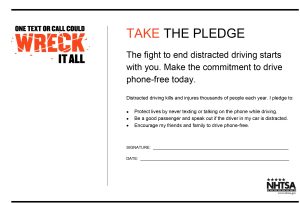
Safety campaigns are critical to preventing distracted driving accidents. There are many out there, offering programs for schools and information online. One effort is from the Massachusetts Academy of Trial Attorneys (MATA), which brings its “End Distracted Driving” program to high schools. We support this campaign. Two of our partners, Marc L. Breakstone and Ronald E. Gluck, serve on the MATA Board of Governors. Partner David W. White is a long-time member.
Another effort comes from the National Highway Traffic Safety Administration (NHTSA), which offers this pledge which family members can sign to promise each other they will not use a cell phone while driving.
Distracted Driving Prevention and Safety Campaigns:
Distraction.gov: Official U.S. website for distracted driving.
It Can Wait!: AT&T’s documentary to stop distracted driving.
Back to School is Time for a Family Talk About Texting While Driving and Distracted Driving
As students head back to classes, this is a good time for families to talk about cell phones and distracted driving.
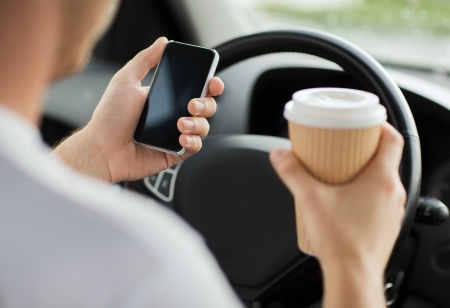
Each day, nine people are killed in the U.S. in crashes involving distracted driving behaviors, such as using a cell phone, texting while driving or eating. More than 1,100 are injured.
There are now 46 states which ban texting while driving, including Massachusetts, which banned the practice in 2010. Junior operators are not allowed to use cell phones at all in Massachusetts.
For Parents
No Cell Phone Rule. Lead by example. Put your cell phone away while driving your children to school. Tell them to put theirs away too because it creates a distraction for you on the roads. Make this a rule for school drop-offs and pick-ups. If you can, extend it to other travel times.
Drop-Off Zone. After you drop your child off at school, resist the urge to immediately check your cell phone in the drop-off zone. Drive away and check later.
Children and Teens
No Cell Phone Use While Commuting. Keep telling your children the cell phone is not for use while commuting to school. Even if they are young and many years away from driving, they can learn now how distracting any cell phone use can be in the car.
Children should not use cell phones while walking or riding bikes to school, either. They can check in with social media, e-mail and text messages at home. If they must, tell them to step several feet off the sidewalk. Make it clear it is not safe to stop in a parking lot.
School Bus. Encourage your child to keep their cell phone packed on the ride so they can be aware of what is going on around them.
Reward Your Child For Not Using a Cell Phone. When your children do as you ask and leave the cell phone packed up, let them know you noticed.
Teen Drivers
Talk to Your Teen Drivers. Take some time to remind them not to use their cell phone behind the wheel. They could seriously injure someone or be stopped by police and face fines and a temporary loss of license.
No Passengers. Do not allow them to carry other teenage passengers with them until they become experienced drivers, and even then they should limit the number of passengers in their cars. Your teenager needs all their energy to focus on the roads and avoid car accidents.
Your teenager may not be happy with your rules, but younger drivers under 25 are two to three times more likely to text or e-mail while driving than others, according to the National Highway Traffic Safety Administration. You want to protect your teenager and help them develop safe habits.
Share Safety Materials. Do not be your teen’s only source of information. Occasionally share safety campaign information or news articles about texting while driving with them. One resource is the AT&T It Can Wait campaign.
Read More


